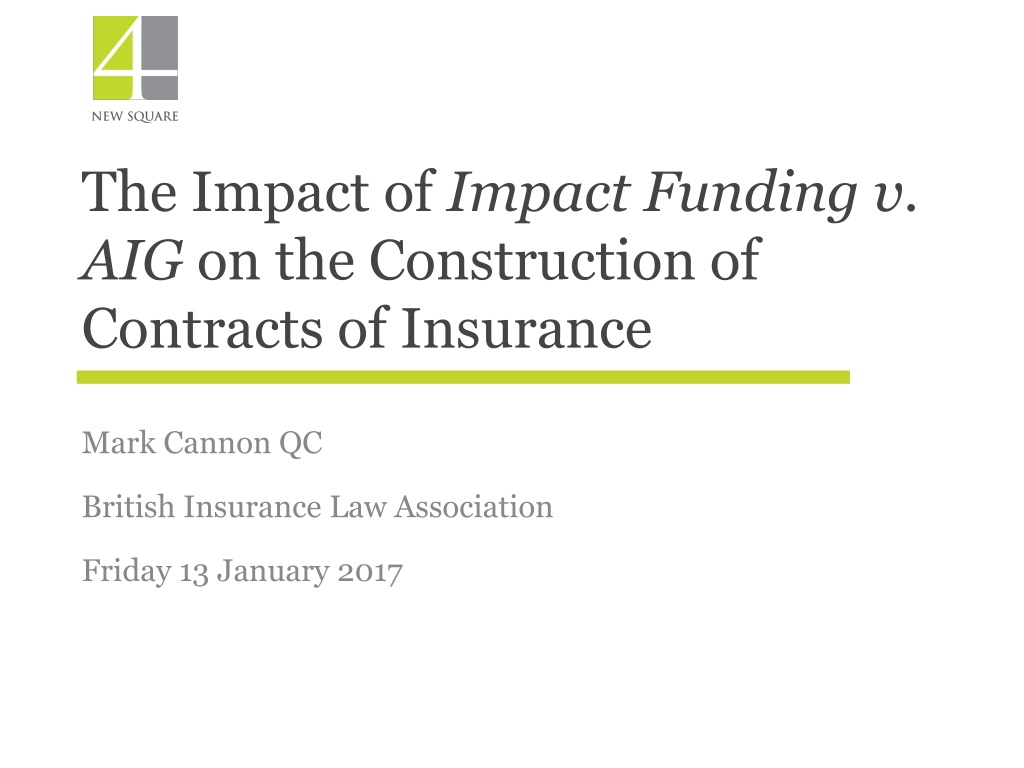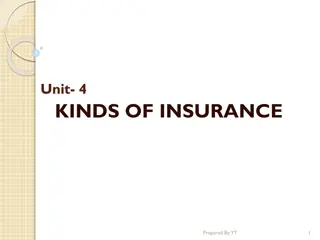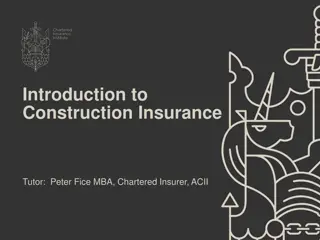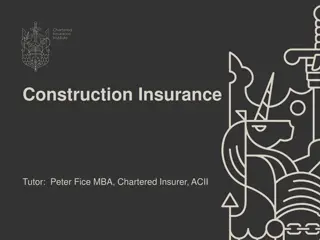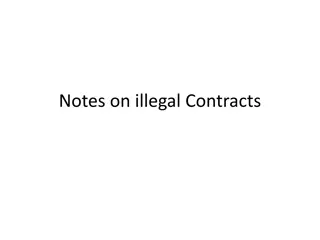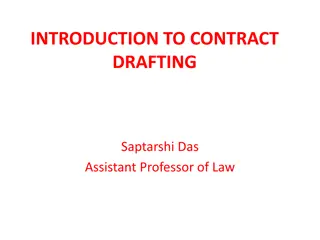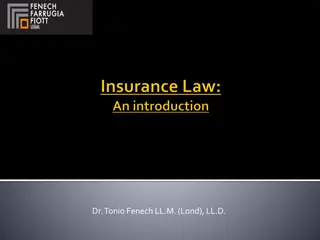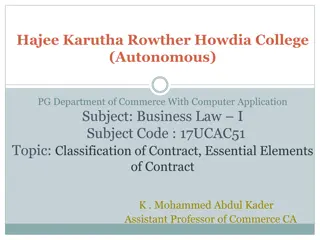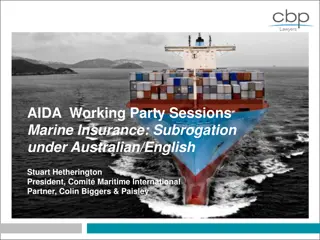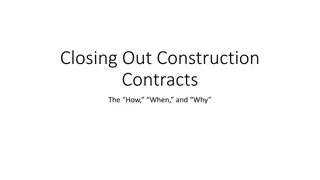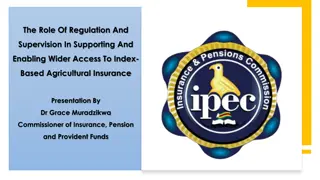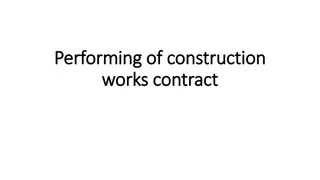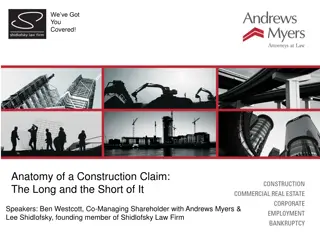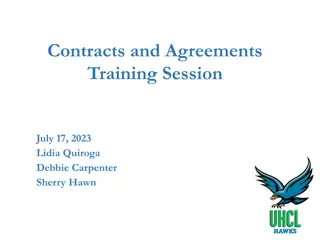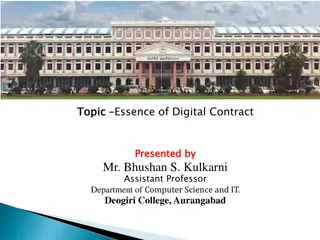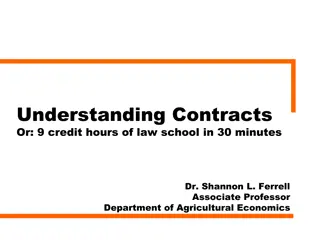Impact of Impact Funding on Insurance Contracts Construction
Exploring the impact of impact funding versus AIG on the construction of insurance contracts, specifically focusing on the insuring clause, exclusion clauses, and the Court of Appeal decision regarding solicitors' professional indemnity insurance. The exclusion clause aims to distinguish personal obligations from professional obligations to prevent insurer liability for solicitors' personal liabilities.
Download Presentation

Please find below an Image/Link to download the presentation.
The content on the website is provided AS IS for your information and personal use only. It may not be sold, licensed, or shared on other websites without obtaining consent from the author. Download presentation by click this link. If you encounter any issues during the download, it is possible that the publisher has removed the file from their server.
E N D
Presentation Transcript
The Impact of Impact Funding v. AIG on the Construction of Contracts of Insurance Mark Cannon QC British Insurance Law Association Friday 13 January 2017
The Insuring Clause The insurer will pay on behalf of any insured all loss resulting from any claim for any civil liability of the insured which arises from the performance of or failure to perform legal services.
The Exclusion This policy shall not cover loss in connection with any claim or any loss: arising out of, based upon, or attributable to any : (i) trading or personal debt incurred by an insured, (ii) breach by any insured of terms of any contract or arrangement for the supply to, or use by, any insured of goods or services in the course of providing legal services; and (iii) guarantee, indemnity or undertaking by any insured in connection with the provision of finance, property, assistance or other benefit or advantage directly or indirectly to that insured.
The Court of Appeal Decision In order to assess these rival arguments, one has to stand back from the detail and ask oneself what is the essential purpose of the exclusion clause 6.6 in the Minimum Terms and Conditions of the solicitors professional indemnity insurance. To my mind the essential purpose of the exclusion is to prevent insurers from being liable for what one might call liabilities of a solicitor in respect of those aspects of his practice which affect him or her personally as opposed to liabilities arising from his professional obligations to his or her clients.
The Court of Appeal Decision It is these sort of personal obligations (which may nevertheless be part of a solicitor's practice as a solicitor) which are not intended to be covered. These obligations are to be distinguished from the obligations which are incurred in connection with the solicitor's duty to his clients which are intended to be covered.
The Court of Appeal Decision It seems to me that obligations arising out of such loans, made to cover disbursements in intended litigation, are essentially part and parcel of the obligations assumed by a solicitor in respect of his professional duties to his client rather than obligations personal to the solicitor. They are inherently part of his professional practice and are assumed as an essential part of his duty is to advise the client as to the likelihood of success in the intended litigation. Disbursements should not be incurred in litigation which is unlikely to succeed.
The Court of Appeal Decision A solicitor, who negligently advises his client that a claim is likely to succeed and causes a client to incur disbursements which should not have been incurred, will be liable to the client for disbursements needlessly incurred. It should make no difference, from the point of view of a professional indemnity insurer, that the disbursement has been incurred before such advice is given or without such advice having been given at all. It follows therefore that liabilities incurred by reason of clauses 6 and/or 13 of the DFMA are liabilities professionally incurred to which clause 6.6 in the Minimum Terms does not apply.
The Law Commissions Example If a decorator agrees to paint the outside woodwork of a house except the garage doors, no- one can seriously regard the words of exception as anything but a convenient way of defining the obligation; it would surely make no difference if the promise were to paint the outside woodwork with a clear proviso that the contractor was not obliged to paint the garage doors, or if there were a definition clause brought to the promisee's attention saying that outside woodwork did not include the garage doors.
The Law Commissions Example Such provisions do not deprive the promisee of a right of a kind which social policy requires that he should enjoy, nor do they give the promisor the advantage of appearing to promise more than he is in fact promising.
Lord Toulson In laying down the minimum terms of professional liability cover required to be maintained by solicitors, it would have been possible committee to have attempted to structure them by defining in positive terms the scope of a solicitor's professional liability for which indemnity cover was required, but it opted to delineate the liability against which solicitors should be required to maintain cover for public protection by a process of elimination, which involved combining an insuring clause far broader than any ordinary understanding of a solicitor's professional liability exclusions. for the drafting with a list of
Lord Toulson It is important to recognise that list for what it is, namely an attempt to identify the types of liability against which solicitors are not required by law to be covered by way of professional liability insurance. I would reject the first stage of Impact's argument about the way in which this policy and the list of exceptions are to be approached.
Lord Toulson It treats the minimum terms set by The Law Society as requiring, through the opening clause, a far broader scope of cover than would have been necessary for the protection of clients and third parties to whom they may undertake professional responsibilities, subject only to exceptions which (it is argued) are to be construed as narrowly as possible. That involves a misapprehension of the true nature and purpose of the minimum terms.
McCann v. Switzerland Insurance Such policies are required for important social purposes. These are not confined to protecting particular legal practitioners, such as the partners in this case. They are intended to protect clients of legal practitioners where such practitioners would not be able otherwise to meet liability from their own resources. Such clients dependent upon the existence and availability of insurance indemnity would then be
McCann v. Switzerland Insurance The relevant terms of the exclusion clause must be approached in light of these important social purposes. Whilst it is true that the exclusion clause appears in policies approved for a statutory purpose, an overly broad ambit should not be attributed to it, at least if doing so would undermine the objectives for which the insurance was required in the first place.
Bedfordshire Police v. Constable It is not unreasonable to start with the premise that a public liability policy will give an indemnity in respect of liability to the public at large. Of course that will depend on the precise terms of cover
Tektrol v. International Insurance [Counsel for insurers] described the exclusion clauses as designed to shape the cover in respect of particular risks. I am prepared to assume that that was the intention, although it does not seem the most obvious drafting technique to achieve it. In any event, I agree with Buxton LJ that the exclusions should, where possible, be narrowly construed. One should start from the presumption that the parties intended an all risks policy to cover all risks, except when they are clearly and unambiguously excluded.
AIG Europe Ltd v. OC320301 LLP It is common ground that the MTC are the product of delegated legislation. The policy underlying the legislation is to ensure that solicitors are financially able to compensate their clients where claims are made against them However, the presence of the limit per claim and the aggregation clause means that the solicitors ability to compensate may be limited to a sum less than the actual claim.
AIG Europe Ltd v. OC320301 LLP Thus, although the court must be entitled when construing the MTC to have regard to the policy underlying the legislation it would be too simplistic to say that when construing the MTC, and in particular, the ambit of the aggregation clause that that construction should be adopted which gives the public the greatest level of protection.
AIG Europe Ltd v. OC320301 LLP The MTC was the result of discussions between the SRA and the insurance industry. The aggregation clause is part of the resulting package. No doubt it could have been more narrowly expressed but then the limit per claim might have been less or the premium may have been greater.
AIG Europe Ltd v. OC320301 LLP Thus, particular the aggregation clause, the court should do so in a neutral manner, neither predisposed to assist the public nor predisposed to assist the insurer. As is the case with all written documents the court's task is to identify the meaning which the instrument would be reasonably understood to bear in its context. when construing the MTC, and in
Jesuit Fathers v. Guardian Insurance In the long run, a contextual but unprincipled approach would render a disservice not only to the industry, but also to insured and to victims. It would lead to further difficulties in obtaining coverage and compensation. Both parties to an insurance contract are entitled to expect that well-established principles will be reflected in the interpretation and application of that contract. In this respect, another form of public interest is also at stake. For these reasons, courts must pay close attention to the structure and actual wording of the policy, read as a whole.
4 NEW SQUARE LINCOLNS INN LONDON WC2A 3RJ WWW.4NEWSQUARE.COM T: +44 20 7822 2000 DX: LDE 1041 E: CLERKS@4NEWSQUARE.COM
